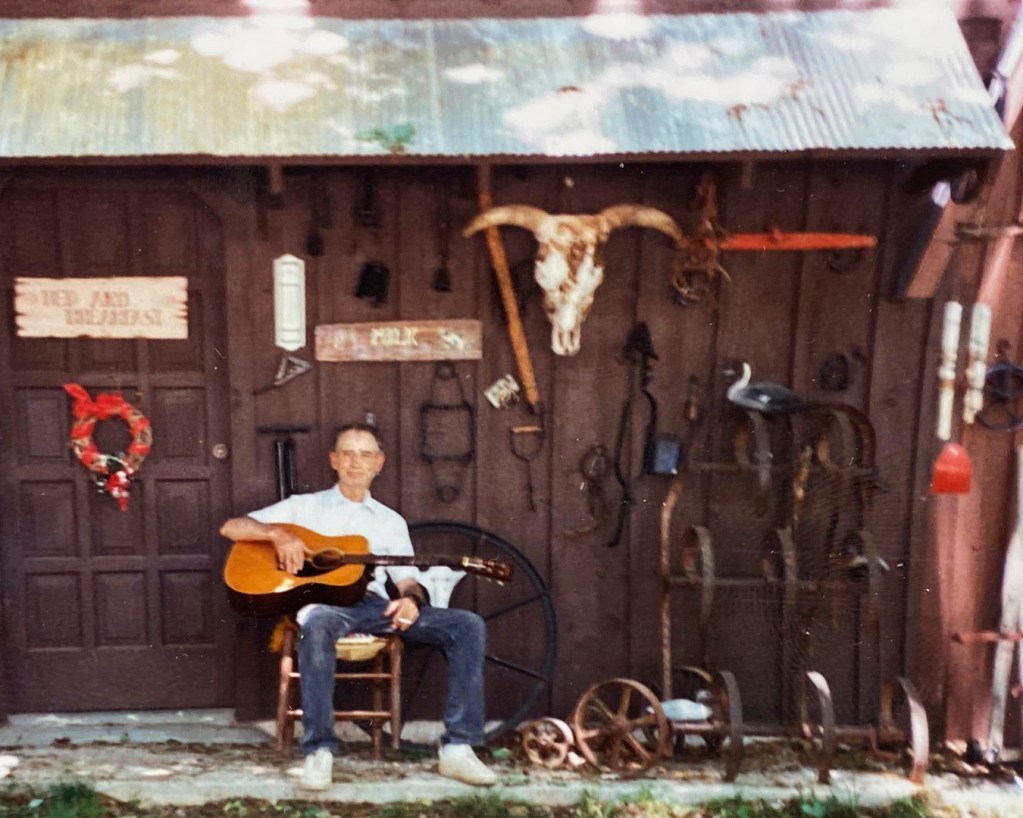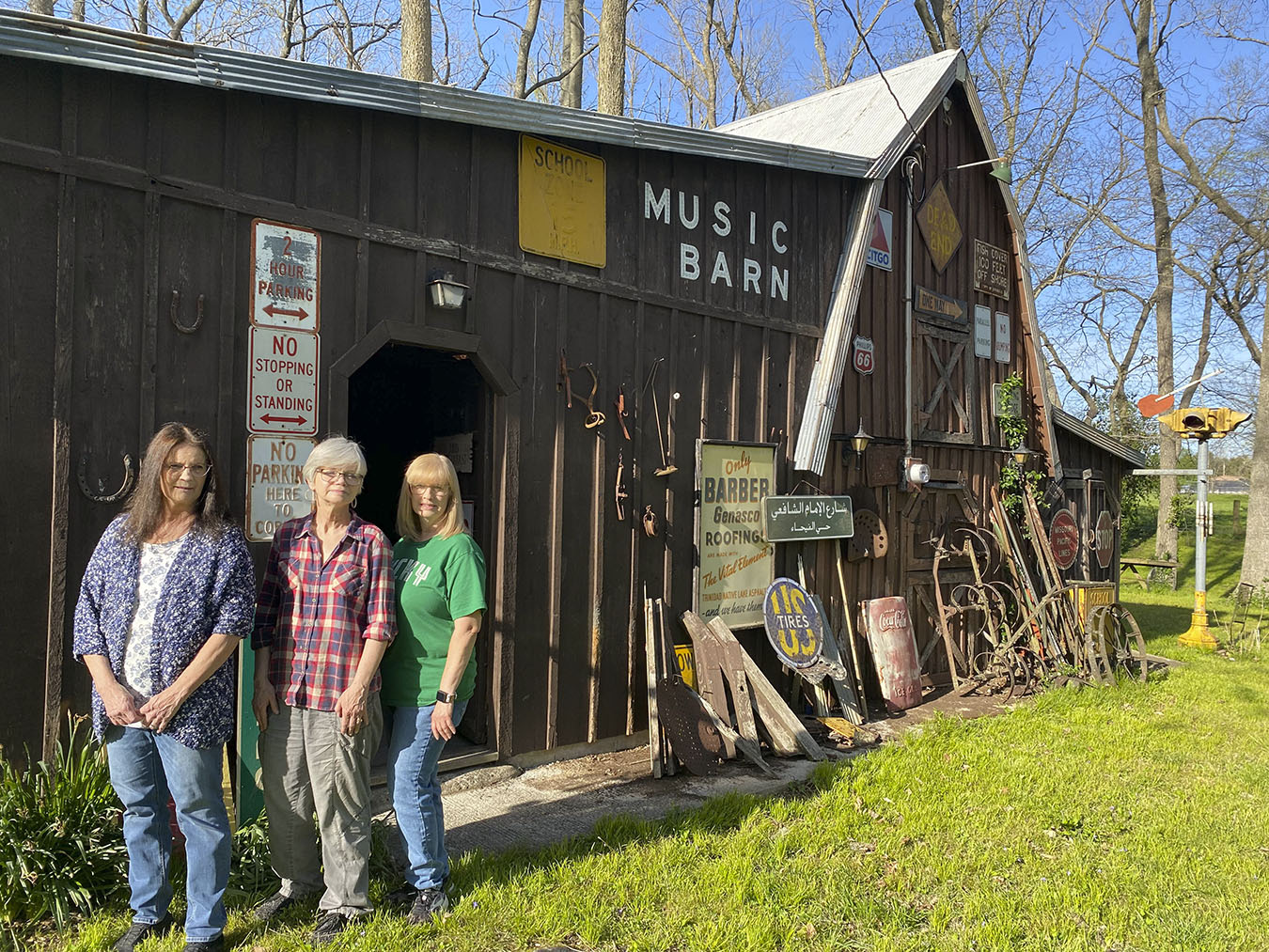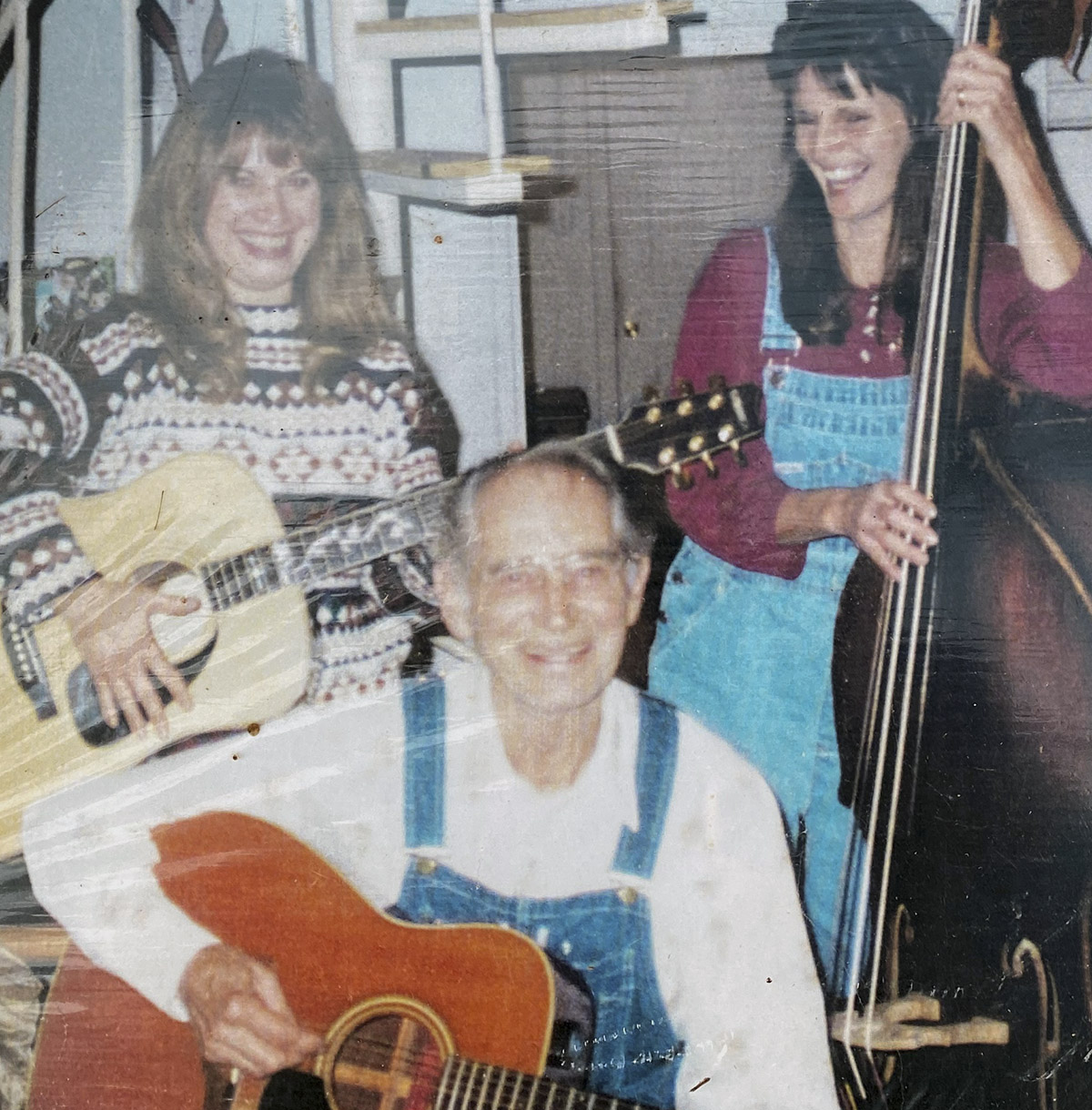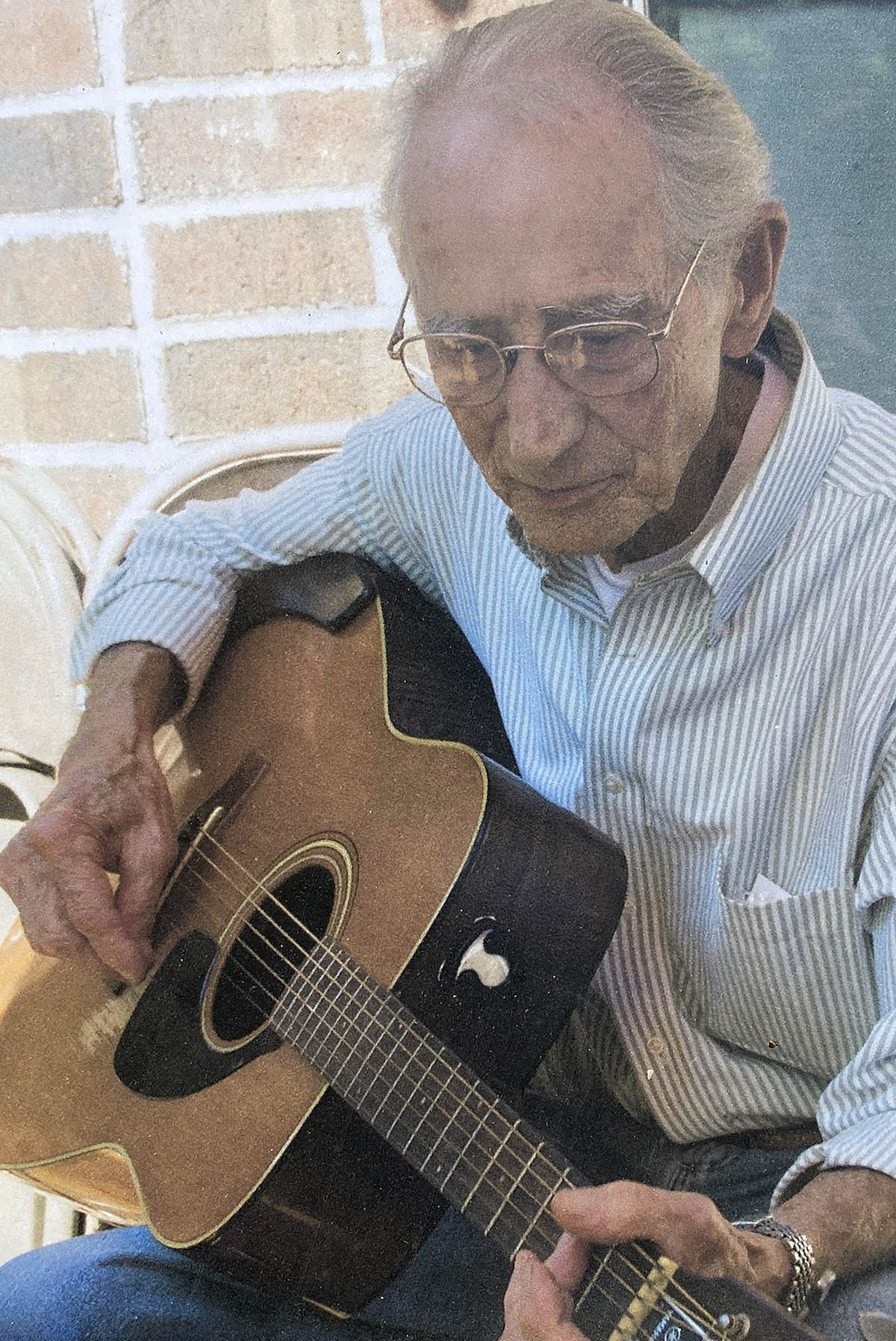Ival Green was born poor amid the Great Depression of the 1930s but he died rich in family and friends 90 years later on April 6.
Ival and his wife Dixie raised three daughters and one son, centering on a home Ival built with his own hands overlooking the Finley River between Nixa and Ozark. He also constructed a barn there that in later years drew dozens of musicians, singers and country music fans for weekly jam sessions.

“Dad always said that nothing brought him more pleasure than knowing he had four good kids, which was something we’ve always tried to live up to,” says Ival’s firstborn, Sandi Green-Baker, who lives in Springfield. “And, of course, we’ve always been button-poppin’ proud of him.”
Similar sentiments are expressed by friends, who describe Ival as humble and modest, with an amazing memory for song lyrics and a talent for fixing electronic sound gear.
“Ival truly was a good ol’ boy,” says Ruby Sims, who met him more than 30 years ago when she brought her father to play at Ival’s Music Barn but wound up participating herself. “He was such a nice guy, very welcoming and encouraging. He talked me into singing. And then he said, ‘If you’re going to sing, you’re going to have to learn to play the guitar.’ And after a couple of years, I was playing along with the rest of them, just as if I’d always done it.”

‘He was a really, really hard worker'
Ival grew up along Pedelo Creek between Linden and Sparta. He’d been born in Kansas City in 1931 and lived for a few years in California as his father, Ollie Manson Green, struggled to recover from lung damage caused by lacquer fumes on his job of painting KC’s trolley cars. The family moved back to Missouri and to the Ozarks about the time Ival was ready to enroll in elementary school, which he did at Sparta and where he eventually graduated from high school.
“Whenever someone asks me about our dad, I always emphasize that he was a really, really hard worker,” says Sandi. “Because his father was ailing, Dad and his brother Floyd would have to go out as young as their preschool years and try to scrape something together. A lot of the responsibility for family finances fell on Dad. He would hire himself out to haul hay or chop wood or build fences.”
“And back then he’d only get paid maybe 10 cents a day for that,” notes Sandi’s middle sister, Becky Yow, who lives in Ozark.
Along with youngest sister, Kelly Taylor, who also lives in Ozark, and brother Terry Green, of Walnut Shade, the Green kids frequently heard Ival’s hard-earned motto: “Do the best you can – you can’t do any better than that.”
As a young man Ival worked on construction crews building homes in central Springfield, and he served in the Air Force as an aircraft mechanic and electronics technician in the early 1950s before returning home and signing on at the Kraft Foods plant.
“He was hired at Kraft as a machinist but he worked in just about every department,” says Sandi. “He retired after 35 years there.”
“He was retired for about the same amount of time — 35 years,” says Becky, “so he thought that was great because he figured he beat the system.”

Built home and barn — and much more
In the early 1960s, Ival put some of the skills he’d learned along the way to design and build the family’s house on land a couple of hundred yards off Missouri Highway 14.
“When Dad bought the property, there wasn’t even a road in,” recalls Sandi. “We had to walk in along the fence line. The place was just covered with gooseberry bushes and buckbrush…”
“And poison ivy!” Kelly interjects.
“...and Dad cleared it all,” says Sandi.
Becky says Ival tamed the tract with a chainsaw and lawnmower. “We’d tag along, and Mom would be yelling at us: ‘Watch out for snakes!’”
A couple of years after the large, innovative A-frame house was finished, Ival built the barn nearby. Originally it was intended to house livestock, and for a while it was home for some calves, hogs and a Shetland pony. But eventually Ival sold the animals, and the barn became his garage and workshop.
“There was one time, I remember, when he went to an auction and bought a couple dozen bushel baskets of what everyone else thought was just junk,” says Sandi. “He brought it all home and just kind of camped out in the barn for a couple of weeks. Then one day he drove out on a tractor! And we’re all going ‘What the heck? Where’d you get that tractor?’ And he said, ‘I made it.’
“He was so good at that kind of thing. He was very mechanically minded. Electrical, too. And if he didn’t have a part that he needed, he would make it.”
Becky says Ival once repaired her grandmother’s television set with components he’d brought back with him from his service in the Air Force. He also once fixed their mom’s electric wheelchair from his old supply of parts, says Sandi. The sisters laugh at recalling how they teased that “either Grandma’s TV set or Mom’s wheelchair was going to take off and fly away some day because of airplane parts Dad put in.”
While the family enjoyed camping adventures at Ozarks lakes spearheaded by Ival — which progressed over the years from sleeping in an Army surplus tent with no floor to a pop-up trailer to a pull-behind trailer to a full-fledged motorhome — the kids’ most fond memories are of enjoying the Finley River in their backyard.
“He hung a swing in a big sycamore tree that we could jump off from into the water,” says Becky.
“It was cool!” says Sandi.
“Uh, not so cool when you’re a baby and they swing you out when you’re still in a diaper,” reminds Kelly.
“Oh, we got into trouble for that!” confesses Becky, whose ears still ring with Ival’s admonition: “Don’t you EVER do that again!”
“All the neighbors would come over and swim behind our house, because we had the swing,” says Becky. “It was the hangout.”

‘A little Disneyland'
Ival taught the kids to make toy fiddles out of cornstalks, popguns out of elderberry branches, kites out of weeds. “That’s how he had to make his toys when he was a child because they were so poor,” Becky says. “But we had fun with them.”
Ival also constructed a zipline, with a cable that carried daring youngsters from the barn loft more than 100 feet to the yard of the house. “It was a little Disneyland around here,” says Becky.
“He did a good job of keeping us kids entertained with all kinds of things he made for us,” agrees Sandy.
The tradition continued with succeeding generations. Becky says in recent years he fixed an electric ride-on vehicle that one of her granddaughters — one of Ival’s five great-grandkids — had received from a garage sale in non-working condition. “Dad could fix anything,” says Becky, “and he really fixed this — I mean he really revved it up! My granddaughter tore around here like the wind in it.”
Ival’s nine grandchildren and the great-grands called Ival “Pappaw” or “Pap.” Granddaughter Kristy Stiber says that even as an adult her grandfather continued to fix her toys:
“On Easter three years ago, before COVID hit, we were all together and my husband, John, and I were trying to fly a kite. But we couldn’t get it to go. So Pap comes out of the house, takes his handkerchief out of his pocket and ties it to the tail of our kite. Then he put a rock into the handkerchief — and with the extra weight, the kite flew! He did that kind of thing for all the grandkids all our lives. ‘Oh, here,’ he’d say, ‘let me fix that for you…’”
The kids aren’t sure exactly when or how, but Ival had learned to play the guitar.
“We have pictures of him playing when he was younger, before any of us were around,” says Kelly. “We got into trouble once playing hide-and-seek because we were hiding in the closet where he kept his guitar — and it got busted because we stepped on it.”
Ival had to modify his guitar-playing style because of an accident while fixing a machine at Kraft that cost him the tip of his ring finger down to the first knuckle, limiting his access to the instrument’s frets.
“We loved it when he taught us to play the guitar because we could do ‘Dad’s fake chords,’” says Becky.
“We called them ‘cheater chords,’” adds Kelly with a laugh.
While her younger sisters mastered plucking the strings, Sandi jokingly describes herself as “a nose-picker — I just play the radio. I can’t even clap very well.”
In her one serious attempt to take up an instrument several years ago, Sandi enrolled in an intense course to learn how to play the ukulele: “I went to class for a week, every day all day long, without telling anybody. I was going to surprise everybody for Christmas by playing Hank Williams’ song ‘Hey, Good Lookin’ for Dad. I was so excited to come home and play this song for him. I said, ‘Dad, you’ll know this song.’ But when I played it, he said, ‘Uh, I don’t know that song.’”
‘Knew more country songs than anybody'

Ival almost certainly was joking. For one thing, he was an inveterate teaser. And for another, his knowledge of song melodies and lyrics was legendary.
“I believe he knew more country songs than anybody I ever met,” says Leonard Robertson, Ival’s longtime friend. “He was amazing!”
“And Ival remembered the words to every song he sang,” marvels Shirley Parham. “He never looked at a sheet of paper. That amazed me. I’m 10 years younger than he was, and I had to have my notebooks to remember the words. But not Ival. He had them all in his head.”
Robertson and Parham were regulars at the gatherings in the Ival’s Music Barn — sometimes numbering 40 or more people — that took place on Monday evenings from the late 1980s to the early 2000s.
The Music Barn tradition grew out of Ival amusing himself by playing his guitar there when the barn was serving as his workshop. He coaxed Becky into strumming along with him, and eventually Kelly, too.
At first it wasn’t very hospitable. “There was a wood stove in there, but no insulation — so it was cold,” Becky recounts. “We’d sit as close as we could and stick our feet up on that stove, and we’d play and play as long as we could — until we finally say ‘It’s cold! Let’s go into the house!’
“Later on he put in some insulation, so it did stay warm in winter. And he began inviting people over to play. Gradually the word got passed around.”
Leonard Robertson often acted as an informal emcee — ‘I just have a big mouth, and they couldn’t shut me up,” he claims — as the microphone was passed around the circle of musicians and singers in the barn, with each in turn selecting a song.
Ival was especially pleased when someone called for one his favorite old country classics, such as “Better Not Do That” or “Red Neck, White Socks and Blue Ribbon Beer” or “Send Me the Pillow That You Dream On.”
Coffee and water and cookies were always available — and cake when it was someone’s birthday.
“Dad would make sure there was plenty of coffee and that the heat was good,” says Becky. “And when everybody had left, he’d clean up.”
“He made sure he talked to every single person who was there that night,” says Sandi.
“Even us,” adds Kelly with a smile.
“And he’d try to get the new people to sing, whether they wanted to or not,” says Becky.
‘Never heard an argument around the barn'
Preston Feldman was Ivan's neighbor for some 35 years. “I’d come down and play a little bit of guitar,” he says. “Everybody was friendly. I never heard an argument around the barn. I figure if there’d been an argument, Ival would’ve put them out.”
Leonard’s wife Sharon Robertson agrees: “It was always just a really good time. Everyone could just come and unwind from their day, and it was like a big family. We’d just sit around and take turns with a song — and if you wanted to, you could join in and harmonize. We had a lot of fun together.”
In addition to contributing to the music with his guitar, Pat O’Neil captured some songs on video, and then shared them with others by putting them on DVDs that he would give away. Becky and Kelly especially treasure a recording that O’Neil produced of them singing a duet of “Daddy’s Hands.” On the same DVD he put a version of “They Don’t Make ‘Em Like My Daddy Anymore” performed by Ruby Sims.
When Ival began to slow down, Sims converted her own horse barn and hosted a music party once a month or so “to give Ival a break. And then when he got to where he didn’t want to do it at all anymore, we started doing it in my barn every week. And he’d come to my place, and to one they had over at Bruner, too.”
Part of Ival’s slowdown was due to health problems experienced by Dixie. She died in 2013, just a few days shy of their 58th wedding anniversary.
“But he stayed pretty active right up until COVID hit,” says Becky. “When he had to stay in the house all the time, he felt isolated. That was hard on him. The last year was when he went down fast.”
Ival may be gone, but he is not forgotten — not by family nor friends.
“Ival Green — let me tell you, that man had the most genuine smile, and his hospitality was second to none,” says Shirley Parham. “I loved Ival. We all loved Ival greatly. We all had the utmost respect for him. Everyone misses him dearly, and always will.”


